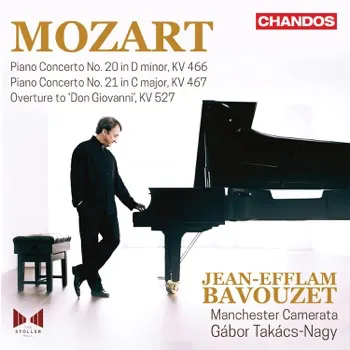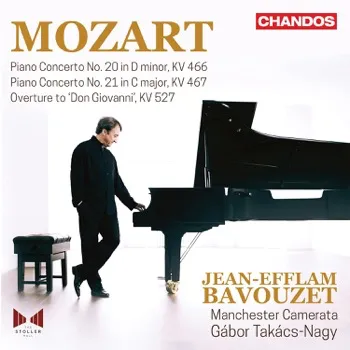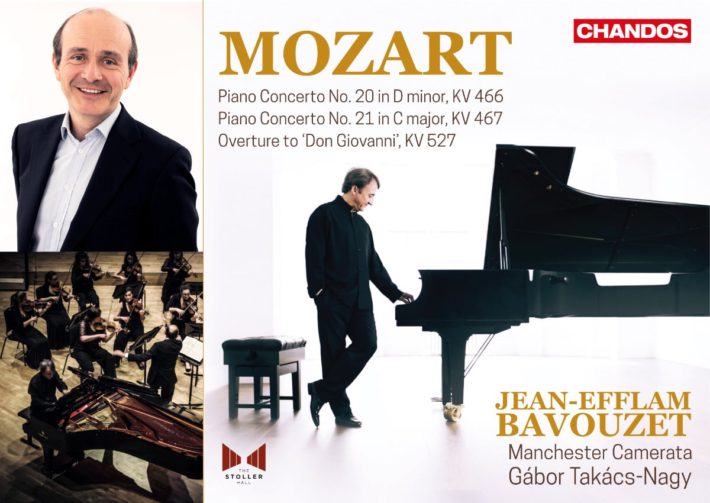This is the fourth volume of Jean-Efflam Bavouzet’s series of the complete Piano Concertos by Mozart, with the Manchester Camerata under Gábor Takács-Nagy. Here we finally get to the big concerti of 1785, No. 20, K.466 and No. 21, K.467.

What makes for a great Mozart Piano Concerto performance is an ability to play the solo segments convincingly (these are, after all, virtuosic pieces from that period) in combination with a superb chamber music performance capabilities. Those following this cycle from the first volume will know what to expect – Bavouzet is tremendously attentive to every nuance from the orchestra, and the dialogues with the woodwinds are especially rewarding. In the first movement of K.467, for example, listen to the rhythmic support the pianist gets from this group at the end of the recapitulation, just before the cadenza (11:30). The beginning of the development section (6:55) shows the Manchester Camerata’s string section gives its share of support.
In the slow movement, after a lovely opening from the orchestra, Bavouzet opts for an improvisational style of the piano part. As any experienced Mozart performer knows, the composer’s piano writing can be surprisingly sparse, most likely relying on his own improvisational skills. Some performers are adding to the original text the bare minimum (Pires is a good example), while others fill-in the bars more daringly (Perahia). Not only does Bavouzet ads additional elements to the piano part, but he also rethinks the phrasing and length of notes, adding an additional element of suspense and curiosity. All additions are appropriately done and never seem to be self-indulgent, the results making this movement sounds like “on the spot” music making.
The third movement starts with a nice transition, with Gábor Takács-Nagy instructs the string section to play the first bars with a single instrument (this is not marked in the original score). The rest is an exemplary exchange of ideas from the soloist and orchestra, concluding a performance of K.467 for the books. The cadenzas in the outer movements are by Friedrich Gulda, not the obvious choice but less outrageously original as Bavouzet’s own cadenzas played on previous volumes.
The dramatic D Minor Concerto (K.466), which closes the album, is something of a mixed bag. The orchestral introduction starts well enough, but something falls down as the soloist enters, the momentum stalls and the entire first movement feels segmented. Turn to similar sized versions such as Goode or Andsnes and you’ll get a riskier, on-the-edge feel not projected here.
It’s also a bit disappointing that the same musical mind that gave us such delightful ornaments in K.467 is not all there in the slow movement of the Minor Concerto, which except for some broken chords in the left-hand keeps the text almost as-is. Small synchronization issues well into the movement do not help making this performance memorable. The stormy middle section, impressively executed by Seong-Jin Cho’s recent version reviewed in these pages, sounds surprisingly cautious.
The third movement is skillfully played, but the fast tempo makes it sound somewhat rushed. Nice woodwind work, though. All in all, this performance is a decent one, but surely not in the same caliber as K.467 nor other Mozart performances we had from this inspiring artist. The cadenzas are Beethoven’s, both played with the same high artistic level Bavouzet showed in his memorable Beethoven cycle.
As in previous volumes, this album includes an orchestral piece which correlates in style or period to the main pieces. Here the Manchester Camerata plays the Don Giovanni Overture in a persuasive, high octane performance that manages to thrill. The only qualm is placing this excellent showpiece before the K.466 Concerto, weakening even further the latter. Listeners may want to skip a track and have this overture as a closing triumph.
Bavouzet sticks to a Yamaha grand for this volume, as he did previously and on his Haydn Sonatas cycle. It suites the interpretation and balanced well with the orchestra. The recording, made within 2 days in September 2018 is on a demonstrative level, though it gives extra presence to the piano in K.466. The booklet contains a well informed and straight-to-the-point article about the music along with short yet illuminating remarks by the pianist. Bavouzet and Takács-Nagy’s K.467 is one of the more impressive versions we had in many years, and listeners will want to purchase this album for this performance and the Don Giovanni Overture alone.
Mozart – Piano Concertos No. 20 (K.466), 21 (K.467); Don Giovanni Overture
Jean-Efflam Bavouzet – Piano
Manchester Camerata
Gábor Takács-Nagy – Conductor
Chandos Records, CD CH20083



















